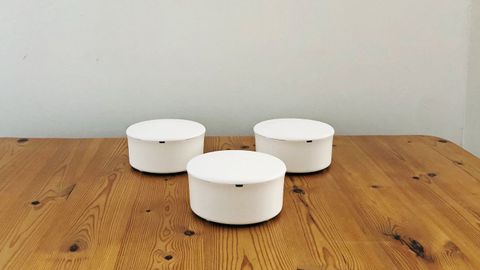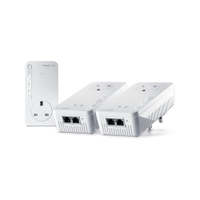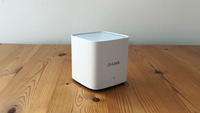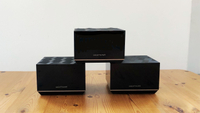TechRadar Verdict
It’s not the fastest mesh system available, but Motorola’s MH7603 is affordable and easy to use, with good parental controls included at no extra cost.
Pros
- +
Affordable Wi-Fi 6 mesh Wi-Fi
- +
Easy to set up
- +
Reliable mesh network
Cons
- -
Only dual-band Wi-Fi
- -
Top speed of 1.8Gbps
Why you can trust TechRadar
Two-minute review
Wireless Connectivity: Wi-Fi 6 (IEEE 802.11ax), dual-band 2.4GHz + 5GHz
Processor: Broadcom BCM6755, quad-core, 1.5GHz
Memory: 256MB RAM
Storage: 128MB Flash
Beamforming: Explicit for 2.4GHz and 5GHz
Ports: 2x Gigabit Ethernet
Motorola was broken up into a number of different divisions about 10 years ago, but the Motorola Mobility division still makes smartphones, as well as smart devices for the home, including its new MH7600 mesh Wi-Fi routers.
Strictly speaking, though, the MH7600 range is actually produced by another company called Minim, which is licensed to use the Motorola logo and brand name, with its networking products sold directly from the Motorola website and other online retailers.
Despite Motorola’s claims of “blazing fast” Wi-Fi performance, the MH7600 mesh routers are actually fairly modest, offering dual-band Wi-Fi 6 with a top speed of 1800Mbps.
Even so, that’s fast enough for most domestic broadband services, and the routers are competitively priced and easy to use.
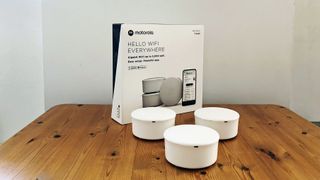
Motorola MH7603 review: Price and availability
- Prices start at $129.99/£110/AU$180
- Available now in the US - TBC in other regions
It’s possible to buy a single mesh router on its own, referred to as the MH7601, for $129.99, or two routers (MH7602) for $189, which should be able to cover homes of up to 3,500 sq.ft in size.
However, we reviewed the top-of-the-range MH7603, which includes three mesh routers that are capable of covering up to 5,000 sq.ft for $239.
That works out at approximately £200/AU$335, although the MH7600 routers haven’t yet received regulatory approval in those regions, so it may take a while for the routers to go on sale outside the US.

Motorola MH7603 review: Design
- Compact design
- Sturdily built
- Easy to use app
The three routers included in the MH7603 are identical, with a neat, circular design that looks like a little jewelry box.
They’re sturdily built, despite the relatively low price, and stand just 66mm high and 127mm in diameter, so they can easily sit on any convenient shelf or table when you set them up. Tucked around the back of each router you’ll find one Gigabit Ethernet port for connecting to your existing broadband router or modem, with a second Ethernet port providing a wired connection for devices such as laptops or games consoles.
Getting started is very straightforward, thanks to the Motosync app - which is also designed by Minim. There are QR codes printed on each of the three routers, so you can simply scan these codes and the app will automatically link the routers together to create your new mesh network for you.
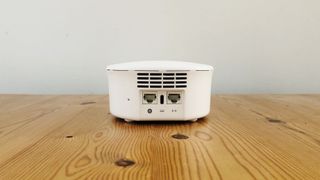
There are some useful features in the app too, including a speed test that can tell you if your network can handle different types of tasks, such as gaming or streaming 4K video. The app also includes content filters that can block adult web sites and other types of material that might be unsuitable for children - and, thankfully, Motorola/Minim doesn’t charge you any extra for these features, as some of its rivals do.
However, the simplicity of the app does mean that it has some limitations. The app just creates a single network that merges the 2.4GHz and 5.0GHz bands, so more experienced users might prefer a mesh system that provides greater control over network settings.
Motorola MH7603 review: Performance
- Fast, reliable mesh Wi-Fi
- Routers also support wired connections
Ookla Speed Test - 2.4/5GHz (download/upload)
Within 5ft, no obstructions: 100Mbps/11Mbps
Within 30ft, three partition walls: 100Mbps/11Mbps
20GB Steam Download - 2.4GHz/5Ghz
Within 5ft, no obstructions: 12.5MB/s
Within 30ft, three partition walls: 12.5MB/s
We set up the three Motorola mesh routers with the first connected to our normal broadband router, so that it could use our existing broadband connection.
The second router was placed in a back office where the Wi-Fi is so poor that we normally rely on a set of powerline adapters to provide a reliable wired connection, while the third router was placed in a hallway between the other two.
A top speed of 1.8Gbps is relatively modest for routers that support Wi-Fi 6, but the MH7603 proved perfectly capable of providing a fast, reliable Wi-Fi signal to that back office.
As expected, devices in the same room as our normal router provided speeds of 100Mbps when running the Ookla Speed Test, and 12.5Mb/s for Steam downloads. Those are the fastest speeds supported by our office broadband service, but the MH7603 didn’t falter at all as I picked up my laptop and wandered along the hall to that back office, maintaining the same speeds for both Ookla and Steam with no trouble at all.
Should you buy the Motorola MH7603 Mesh WiFi 6 System?
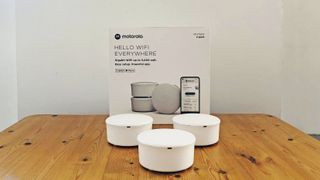
Buy it if...
You’re on a budget
It may not be the fastest mesh Wi-Fi system around, but a price of just $239 for this three-router kit means that the MH7603 is competitively priced when compared to most of its mesh rivals.
You want to keep it simple
The Motosync app is a bit basic, but it’s a good option for people who haven’t used a mesh Wi-Fi system before. The app can simply scan the QR codes printed on each router and then automatically link them together and set up your new mesh network for you.
You need parental controls
Many of the best routers and mesh Wi-Fi systems charge an extra monthly subscription for content filters that can block material that is unsuitable for children, but the Motosync app includes filters and other parental controls free of charge.
Don't buy it if...
You need top speed
A top speed of 1.8Gbps is pretty modest for a Wi-Fi 6 router, and gamers or homes that have lots of devices competing for bandwidth may prefer a more expensive mesh system that provides greater speed.
You’re a network guru
The Motosync app is easy to use, but it’s fairly basic and more experienced users may prefer a mesh system that provides more advanced options for setting up and configuring their new network.
You live in a small apartment
The three-router MH7603 is designed for larger homes of up to 5,000 sq.ft in size. If you only have a couple of bedrooms then you can probably get by with a two-router mesh system, or perhaps just a single router on its own.
Also consider...
Devolo Magic 2 WiFi 6
A more expensive alternative to a conventional mesh Wi-Fi system, but the Magic 2 WiFi 6 uses PowerLine networking to provide a wired connection that can penetrate thick walls and other obstacles that can block your Wi-Fi signal.
Check out our Devolo Magic 2 WiFi 6 review.
D-Link Eagle Pro AI M15
One of the cheapest mesh Wi-Fi systems that we’ve come across, costing just $99.99 for a two-router kit, or $120 with three routers. Its top speed is only 1.5Gbps, but that’s still fast enough for many home broadband services.
Check out our D-Link Eagle Pro AI M15 review.
Netgear Nighthawk MK83
If you need a bit more speed, then Netgear’s Nighthawk MK83 is a good option for gaming and streaming entertainment. It costs $399.99, but it provides tri-band Wi-Fi 6, and at 3.6Gbps is twice as fast as the MH7603.
Check out our Netgear Nighthawk MK83 review.
First reviewed June 2022.
How We Test
We pride ourselves on our independence and our rigorous review-testing process, offering up long-term attention to the products we review and making sure our reviews are updated and maintained - regardless of when a device was released, if you can still buy it, it's on our radar.
Cliff Joseph is a former Editor of MacUser magazine, and a freelance technology writer with 30 year’s experience in the industry (and old enough to remember when Apple was close to going bust…).
His first job involved using Macs for magazine sub-editing and typesetting, which led to the realisation that these computer-thingies might actually turn out to be useful after all. After a few years specialising in the Mac side of the market, he went freelance and embraced the wide world of digital technology, including Windows PCs, digital audio and hi-fi, and networking. Somewhere along the line he also developed a bit of a gaming habit and has stubbornly waved the flag for Mac gaming for far too many years.

Inside the company making 35-year-old Game Boys look and work like new

AMD teams up with Arm to unveil AI chip family that does preprocessing, inference and postprocessing on one silicon — but you will have to wait more than 12 months to get actual products

The US takes another big step towards banning TikTok – here's what you need to know
